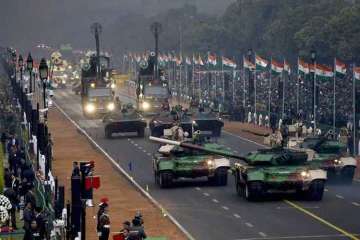After 20 years of Kargil, India awaits defence reforms
On the 20th anniversary of the Kargil conflict, several defence experts told IANS that they were looking up to the Narendra Modi-led government to implement the national security plan proposed by the Kargil Review Committee which was reviewed again in 2011.

Twenty years is a long time to learn lessons, but appointing a Chief of Defence Staff (CDS), an idea to ramp up higher management of the armed services, still remains elusive despite the overall acceptance about its necessity.
On the 20th anniversary of the Kargil conflict, several defence experts told IANS that they were looking up to the Narendra Modi-led government to implement the national security plan proposed by the Kargil Review Committee which was reviewed again in 2011.
The issue of having a CDS as an overarching single point advisor to the government on defence matters has been a complex one with serious differences among the armed services as well as the reluctance of the political establishment to create a new military power center.
The Modi government in its first tenure (2014-2019) had revived the proposal after the United Progressive Alliance (UPA) found ways to work around it rather than on it.
Returning with even a stronger mandate, Modi 2.0 is expected to take the much-needed steps for restructuring the national security architecture.
Talking to IANS, former Navy chief Admiral (retd) Arun Prakash said, "Twelve years after the Kargil Review Committee was formed, another panel was constituted in 2011 under the chairmanship of Naresh Chandra to examine national security reforms. It came as a surprise but also raised hopes that the UPA government was perhaps serious in seeking long-overdue reform in national security."
Notably, Admiral Prakash happened to be a member of both the 2000 task force and the 2011 committee.
As per his observation, the issues, conundrums, and lacunae in dealing with both the bodies were substantially the same.
He said that the former bureaucrats nominated to the committee and those serving in the Defence Ministry were firm that all was well with the national security structures and no change or reform was either necessary, nor possible.
Some changes did come up and the big one was the raising of the Integrated Defence Staff (IDS) headquarters in November 2001, but the much-needed appointment of CDS was yet to be made.
Notably, the recommendations of the Kargil Review Committee were considered by a Group of Ministers (GoMs) which made specific proposals for implementation based on the analysis carried out by four task forces.
Based on the recommendations of the GoMs, the Integrated Defence Staff was set up by the government in November 2001.
Among the various recommendations, the restructuring of the Indian military, integration of service headquarters and creation of CDS remained work in progress.
According to Lt General (retd) Satish Dua, after the Kargil Review Committee, a committee of GoMs was constituted which was headed by the then Deputy Prime Minister L.K. Advani and four task forces were created. Some recommendations of these task forces were accepted while some were not.
"The Integrated Defence Staff (IDS) headquarters which I headed was created after the Kargil conflict. But the appointment of a CDS could not be made" Dua said.
Asked about his expectation from the present government, Dua said that in the previous five years of the NDA government, Prime Minister Modi had given a push to integrate the three services. In 2019, after coming to power with an even bigger mandate, he expects things to move in a positive direction.
Major General (retd) G.D. Bakshi, a well-known defence expert, told IANS, "What happened 20 years ago in Kargil will never happen as all the gaps leading to the intrusion have been fully plugged. Moreover, Pakistan is not likely to repeat such misadventurism."
"The creation of the CDS could not see the light of the day while integration of the headquarters has not been done, which is very much needed," he added.
The country should always remain alert but for that, modernisation of military was needed which was lagging and moreover, the Indian Air Force too needed a good number of fighter aircraft, Bakshi said.
Brigadier (retd) S.K. Chatterjee said, "After the Kargil conflict, the major change was the formation of the IDS headquarters. Other than IDS, the Strategic Forces Command also came up.
"The Integrated Battle Groups (IBG) concept is now being tested in two formations. This will involve the removal of divisional headquarters. IBG will work directly under the Corps."
ALSO READ | Pak parliament approves Rs 1,150 billion defence budget
ALSO READ | Defence Minister Rajnath Singh makes maiden visit to Eastern Naval Command
ALSO READ | VVIP chopper scam: Defence Ministry extends ban on Italian company Leonardo